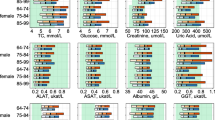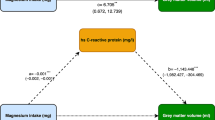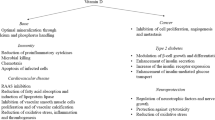Abstract
Purpose
It is unclear if midlife consumption of dairy and soy food intake, and their components of calcium and isoflavones (in soy), is related to cognitive impairment in elderly.
Methods
We used baseline data on lifestyle and habitual diet of 16,948 participants collected during their recruitment into the Singapore Chinese Health Study from 1993 to 1998, and data on their cognitive function, measured using a 30-item Singapore modified Mini-Mental State Examination, during follow-up interviews from 2014 to 2016. We used multivariable logistic regression models to estimate the odds ratios (ORs) and 95% confidence intervals (CIs) for developing cognitive impairment.
Results
Higher dairy intake was associated with a lower risk of cognitive impairment in a dose-dependent manner (P for trend = 0.009). Compared to the lowest quartile of dairy intake, ORs (95% CIs) were 0.93 (0.81–1.07) for the second, 0.88 (0.76–1.01) for the third, and 0.82 (0.72–0.94) for the fourth quartiles of intake. Similar results were found for dairy calcium intake (P for trend = 0.008). However, there was no statistically significant association for intake of soy (OR comparing extreme quartiles 0.99, 95% CI 0.87–1.14, P for trend = 0.92), isoflavones (OR 1.01, 95% CI 0.88–1.15, P for trend = 0.90) or non-dairy calcium (OR 1.06, 95% CI 0.86–1.30, P for trend = 0.81) with risk of cognitive impairment.
Conclusions
Dairy intake at midlife could have a protective association against cognitive impairment that may not be attributed to its calcium content alone, while soy or isoflavone intake was not associated with the cognition of elderly in our study.
Similar content being viewed by others
References
Ulamek-Koziol M, Czuczwar SJ, Pluta R (2016) Nutrients and mild cognitive impairment: food for thought. Nutrition 32(7–8):910–912. https://doi.org/10.1016/j.nut.2016.01.006
Vandewoude M, Barberger-Gateau P, Cederholm T, Mecocci P, Salva A, Sergi G, Topinkova E, Van Asselt D (2016) Healthy brain ageing and cognition: nutritional factors. Eur Geriatr Med 7(1):77–85. https://doi.org/10.1016/j.eurger.2015.12.005
Wu L, Sun D (2016) meta-analysis of milk consumption and the risk of cognitive disorders. Nutrients. https://doi.org/10.3390/nu8120824
Crichton GE, Bryan J, Murphy KJ, Buckley J (2010) Review of dairy consumption and cognitive performance in adults: findings and methodological issues. Dement Geriatr Cogn Disord 30(4):352–361. https://doi.org/10.1159/000320987
Soedamah-Muthu SS, Verberne LD, Ding EL, Engberink MF, Geleijnse JM (2012) Dairy consumption and incidence of hypertension: a dose-response meta-analysis of prospective cohort studies. Hypertension 60(5):1131–1137. https://doi.org/10.1161/HYPERTENSIONAHA.112.195206
McGrane MM, Essery E, Obbagy J, Lyon J, Macneil P, Spahn J, Van Horn L (2011) Dairy consumption, blood pressure, and risk of hypertension: an evidence-based review of recent literature. Curr Cardiovasc Risk Rep 5(4):287–298. https://doi.org/10.1007/s12170-011-0181-5
Ralston RA, Lee JH, Truby H, Palermo CE, Walker KZ (2012) A systematic review and meta-analysis of elevated blood pressure and consumption of dairy foods. J Hum Hypertens 26(1):3–13. https://doi.org/10.1038/jhh.2011.3
Astrup A (2014) Yogurt and dairy product consumption to prevent cardiometabolic diseases: epidemiologic and experimental studies. Am J Clin Nutr 99(5 Suppl):1235S–1242S. https://doi.org/10.3945/ajcn.113.073015
Picano E, Bruno RM, Ferrari GF, Bonuccelli U (2014) Cognitive impairment and cardiovascular disease: so near, so far. Int J Cardiol 175(1):21–29. https://doi.org/10.1016/j.ijcard.2014.05.004
Alzheimer’s Association Calcium Hypothesis W (2017) Calcium Hypothesis of Alzheimer’s disease and brain aging: A framework for integrating new evidence into a comprehensive theory of pathogenesis. Alzheimers Dement 13(2):178–182 e117. https://doi.org/10.1016/j.jalz.2016.12.006
Wang L, Manson JE, Sesso HD (2012) Calcium intake and risk of cardiovascular disease: a review of prospective studies and randomized clinical trials. Am J Cardiovasc Drugs 12(2):105–116. https://doi.org/10.2165/11595400-000000000-00000
Ozawa M, Ninomiya T, Ohara T, Hirakawa Y, Doi Y, Hata J, Uchida K, Shirota T, Kitazono T, Kiyohara Y (2012) Self-reported dietary intake of potassium, calcium, and magnesium and risk of dementia in the Japanese: the Hisayama Study. J Am Geriatr Soc 60(8):1515–1520. https://doi.org/10.1111/j.1532-5415.2012.04061.x
Cherbuin N, Kumar R, Sachdev PS, Anstey KJ (2014) Dietary mineral intake and risk of mild cognitive impairment: the PATH through life project. Front Aging Neurosci 6:4. https://doi.org/10.3389/fnagi.2014.00004
Talaei M, Pan A, Yuan JM, Koh WP (2018) Dairy intake and risk of type 2 diabetes. Clin Nutr 37(2):712–718. https://doi.org/10.1016/j.clnu.2017.02.022
Talaei M, Pan A, Yuan JM, Koh WP (2017) Dairy food intake is inversely associated with risk of hypertension: the Singapore Chinese Health Study. J Nutr 147(2):235–241. https://doi.org/10.3945/jn.116.238485
Butler LM, Wong AS, Koh WP, Wang R, Yuan JM, Yu MC (2010) Calcium intake increases risk of prostate cancer among Singapore Chinese. Cancer Res 70(12):4941–4948. https://doi.org/10.1158/0008-5472.CAN-09-4544
Prince M, Bryce R, Albanese E, Wimo A, Ribeiro W, Ferri CP (2013) The global prevalence of dementia: a systematic review and metaanalysis. Alzheimers Dement 9(1):63– e6275. https://doi.org/10.1016/j.jalz.2012.11.007
Zhao L, Brinton RD (2007) WHI and WHIMS follow-up and human studies of soy isoflavones on cognition. Expert Rev Neurother 7(11):1549–1564. https://doi.org/10.1586/14737175.7.11.1549
Soni M, Rahardjo TB, Soekardi R, Sulistyowati Y, Lestariningsih Yesufu-Udechuku A, Irsan A, Hogervorst E (2014) Phytoestrogens and cognitive function: a review. Maturitas 77(3):209–220. https://doi.org/10.1016/j.maturitas.2013.12.010
Thaung Zaw JJ, Howe PRC, Wong RHX (2017) Does phytoestrogen supplementation improve cognition in humans? A systematic review. Ann N Y Acad Sci 1403(1):150–163. https://doi.org/10.1111/nyas.13459
Hankin JH, Stram DO, Arakawa K, Park S, Low SH, Lee HP, Yu MC (2001) Singapore Chinese Health Study: development, validation, and calibration of the quantitative food frequency questionnaire. Nutr Cancer 39(2):187–195. https://doi.org/10.1207/S15327914nc392_5
Stram DO, Hankin JH, Wilkens LR, Pike MC, Monroe KR, Park S, Henderson BE, Nomura AM, Earle ME, Nagamine FS, Kolonel LN (2000) Calibration of the dietary questionnaire for a multiethnic cohort in Hawaii and Los Angeles. Am J Epidemiol 151(4):358–370
Seow A, Shi CY, Franke AA, Hankin JH, Lee HP, Yu MC (1998) Isoflavonoid levels in spot urine are associated with frequency of dietary soy intake in a population-based sample of middle-aged and older Chinese in Singapore. Cancer Epidemiol Biomark Prev 7(2):135–140
Talaei M, Lee BL, Ong CN, van Dam RM, Yuan JM, Koh WP, Pan A (2016) Urine phyto-oestrogen metabolites are not significantly associated with risk of type 2 diabetes: the Singapore Chinese health study. Br J Nutr 115(9):1607–1615. https://doi.org/10.1017/S0007114516000581
Talaei M, Koh WP, van Dam RM, Yuan JM, Pan A (2014) Dietary soy intake is not associated with risk of cardiovascular disease mortality in Singapore Chinese adults. J Nutr 144(6):921–928. https://doi.org/10.3945/jn.114.190454
Feng L, Chong MS, Lim WS, Ng TP (2012) The Modified Mini-Mental State Examination test: normative data for Singapore Chinese older adults and its performance in detecting early cognitive impairment. Singap Med J 53(7):458–462
Folstein MF, Folstein SE, McHugh PR (1975) “Mini-mental state”. A practical method for grading the cognitive state of patients for the clinician. J Psychiatr Res 12(3):189–198
Arevalo-Rodriguez I, Smailagic N, Roque IFM, Ciapponi A, Sanchez-Perez E, Giannakou A, Pedraza OL, Bonfill Cosp X, Cullum S (2015) Mini-Mental State Examination (MMSE) for the detection of Alzheimer’s disease and other dementias in people with mild cognitive impairment (MCI). Cochrane Database Syst Rev 3:CD010783. https://doi.org/10.1002/14651858.cd010783.pub2
Tse CS, Chang JF, Leung GT, Fung AW, Hau KT, Chiu HF, Lam LC (2013) Effects of education on very mild dementia among Chinese people in Hong Kong: potential mediators in the Cantonese Mini-Mental State Examination tasks. Aging Ment Health 17(3):310–318. https://doi.org/10.1080/13607863.2012.743962
Katzman R, Zhang MY, Ouang Ya Q, Wang ZY, Liu WT, Yu E, Wong SC, Salmon DP, Grant I (1988) A Chinese version of the Mini-Mental State Examination; impact of illiteracy in a Shanghai dementia survey. J Clin Epidemiol 41(10):971–978
Willett W, Stampfer MJ (2013) Implications of total energy intake for epidemiologic analysis. In: Willett W (ed) Nutritional epidemiology, vol 30, 3rd edn. Oxford University Press, Oxford, p 260
Imtiaz B, Tolppanen AM, Kivipelto M, Soininen H (2014) Future directions in Alzheimer’s disease from risk factors to prevention. Biochem Pharmacol 88(4):661–670. https://doi.org/10.1016/j.bcp.2014.01.003
Yusufov M, Weyandt LL, Piryatinsky I (2017) Alzheimer’s disease and diet: a systematic review. Int J Neurosci 127(2):161–175. https://doi.org/10.3109/00207454.2016.1155572
Odegaard AO, Koh WP, Butler LM, Duval S, Gross MD, Yu MC, Yuan JM, Pereira MA (2011) Dietary patterns and incident type 2 diabetes in chinese men and women: the Singapore Chinese health study. Diabetes Care 34(4):880–885. https://doi.org/10.2337/dc10-2350
Odegaard AO, Koh WP, Yuan JM, Gross MD, Pereira MA (2014) Dietary patterns and mortality in a Chinese population. Am J Clin Nutr 100(3):877–883. https://doi.org/10.3945/ajcn.114.086124
Dai Z, Butler LM, van Dam RM, Ang LW, Yuan JM, Koh WP (2014) Adherence to a vegetable-fruit-soy dietary pattern or the Alternative Healthy Eating Index is associated with lower hip fracture risk among Singapore Chinese. J Nutr 144(4):511–518. https://doi.org/10.3945/jn.113.187955
Ozawa M, Ohara T, Ninomiya T, Hata J, Yoshida D, Mukai N, Nagata M, Uchida K, Shirota T, Kitazono T, Kiyohara Y (2014) Milk and dairy consumption and risk of dementia in an elderly Japanese population: the Hisayama Study. J Am Geriatr Soc 62(7):1224–1230. https://doi.org/10.1111/jgs.12887
Yamada M, Kasagi F, Sasaki H, Masunari N, Mimori Y, Suzuki G (2003) Association between dementia and midlife risk factors: the Radiation Effects Research Foundation Adult Health Study. J Am Geriatr Soc 51(3):410–414
Almeida OP, Norman P, Hankey G, Jamrozik K, Flicker L (2006) Successful mental health aging: results from a longitudinal study of older Australian men. Am J Geriatr Psychiatry 14(1):27–35. https://doi.org/10.1097/01.JGP.0000192486.20308.42
Vercambre MN, Boutron-Ruault MC, Ritchie K, Clavel-Chapelon F, Berr C (2009) Long-term association of food and nutrient intakes with cognitive and functional decline: a 13-year follow-up study of elderly French women. Br J Nutr 102(3):419–427. https://doi.org/10.1017/S0007114508201959
DeRight J, Jorgensen RS, Cabral MJ (2015) Composite cardiovascular risk scores and neuropsychological functioning: a meta-analytic review. Ann Behav Med 49(3):344–357. https://doi.org/10.1007/s12160-014-9681-0
Gottesman RF, Albert MS, Alonso A, Coker LH, Coresh J, Davis SM, Deal JA, McKhann GM, Mosley TH, Sharrett AR, Schneider ALC, Windham BG, Wruck LM, Knopman DS (2017) Associations between midlife vascular risk factors and 25-year incident dementia in the atherosclerosis risk in communities (ARIC) cohort. JAMA Neurol 74(10):1246–1254. https://doi.org/10.1001/jamaneurol.2017.1658
Talaei M, Koh WP, Yuan JM, Pan A (2017) The association between dairy product intake and cardiovascular disease mortality in Chinese adults. Eur J Nutr 56(7):2343–2352. https://doi.org/10.1007/s00394-016-1274-1
Gueguen L, Pointillart A (2000) The bioavailability of dietary calcium. J Am Coll Nutr 19(2 Suppl):119S–136S
Lee M, Lee H, Kim J (2018) Dairy food consumption is associated with a lower risk of the metabolic syndrome and its components: a systematic review and meta-analysis. Br J Nutr 120(4):373–384. https://doi.org/10.1017/S0007114518001460
White LR, Petrovitch H, Ross GW, Masaki K, Hardman J, Nelson J, Davis D, Markesbery W (2000) Brain aging and midlife tofu consumption. J Am Coll Nutr 19(2):242–255
Nakamoto M, Otsuka R, Nishita Y, Tange C, Tomida M, Kato Y, Imai T, Sakai T, Ando F, Shimokata H (2018) Soy food and isoflavone intake reduces the risk of cognitive impairment in elderly Japanese women. Eur J Clin Nutr. https://doi.org/10.1038/s41430-017-0061-2
Huang MH, Luetters C, Buckwalter GJ, Seeman TE, Gold EB, Sternfeld B, Greendale GA (2006) Dietary genistein intake and cognitive performance in a multiethnic cohort of midlife women. Menopause 13(4):621–630. https://doi.org/10.1097/01.gme.0000227336.35620.8f
Greendale GA, Huang MH, Leung K, Crawford SL, Gold EB, Wight R, Waetjen E, Karlamangla AS (2012) Dietary phytoestrogen intakes and cognitive function during the menopausal transition: results from the Study of Women’s Health Across the Nation Phytoestrogen Study. Menopause 19(8):894–903. https://doi.org/10.1097/gme.0b013e318242a654
Acknowledgements
We thank Siew-Hong Low of the National University of Singapore for supervising the fieldwork in the Singapore Chinese Health Study and Renwei Wang for the maintenance of the cohort study database. Finally, we acknowledge the founding Principal Investigator of the Singapore Chinese Health Study, Mimi C. Yu.
Funding
This work was supported by the Singapore National Medical Research Council (NMRC/CSA/0055/2013) and the United States National Cancer Institute, National Institutes of Health (UM1 CA182876 and R01 CA144034), and the Saw Swee Hock School of Public Health, National University of Singapore. M Talaei is supported by Cambridge-NUHS Seed Fund (NUHSRO/2017/015/Cambridge/01). A Pan is supported by the National Key Research and Development Program of China (2017YFC0907504). The funders had no role in study design, data collection and analysis, decision to publish, or preparation of the manuscript.
Author information
Authors and Affiliations
Contributions
MT: analyzed data and wrote the first draft; WPK, AP, and LF: designed and conducted the study; WPK, JMY, AP, LF: assisted in interpreting the data and critically edited the manuscript; WPK supervised data analysis and had primary responsibility for final content. All authors read and approved the final manuscript.
Corresponding authors
Ethics declarations
Conflict of interest
None to be declared. On behalf of all authors, the corresponding author states that there is no conflict of interest.
Electronic supplementary material
Below is the link to the electronic supplementary material.
Rights and permissions
About this article
Cite this article
Talaei, M., Feng, L., Yuan, JM. et al. Dairy, soy, and calcium consumption and risk of cognitive impairment: the Singapore Chinese Health Study. Eur J Nutr 59, 1541–1552 (2020). https://doi.org/10.1007/s00394-019-02010-8
Received:
Accepted:
Published:
Issue Date:
DOI: https://doi.org/10.1007/s00394-019-02010-8




